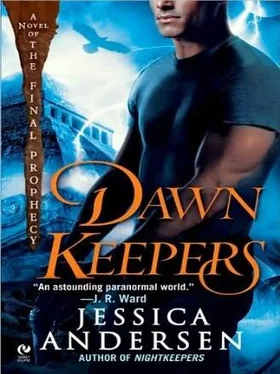She’d made him promise not to go there during his thesis defense, knowing that Desiree would crucify him if he so much as breathed a word about things the establishment considered barely a step up from tinfoil hats and Area 51, namely the 2012 doomsday and the Nightkeepers. Which was why she sent him a warning look and mouthed, You promised .
He nodded, but there was something in his eyes that made her wonder whether he was accepting her warning or telling her to mind her own damn business.
“Since we’re finally all here,” Desiree said pointedly, “I’d like to get started. If that’s okay with Anna, of course.”
Bitch, Anna thought, but didn’t say. Instead she took the chair beside Thor and nodded. “By all means, let’s get started.”
By the time Lucius was about twenty minutes into his presentation, Anna was starting to relax a little, because he was sticking to the script, thank the gods. Then Desiree held up a hand, interrupting.
Lucius broke off in the middle of explaining his translation of a panel deep within the Pyramid of Kulkulkan at Chichén Itzá. “Yes?”
Desiree pointed to a badly eroded glyph at the lower right corner of the screen. “What about that one?”
Anna stiffened and tried to catch Lucius’s eye. Don’t do it, she mouthed. Say you don’t know.
He avoided her gaze, but answered carefully enough. “There’s some debate about that particular glyph.”
“We’re working on it,” Anna interjected. “As you can see, it’s not in the best condition, which unfortunately means that we may never have a conclusive answer. Or maybe we’ll find a second occurrence of the glyph in the future. Regardless, it should be considered outside the scope of this project.” Which was academia-speak for back off, bitch .
“Your opinion is noted, Professor Catori.” Desiree didn’t even glance at Anna; she kept her unblinking focus on Lucius, a predator sensing weakness. “However, it’s not really a question of scope; it’s a question of propriety. I’m well aware of what Mr. Hunt thinks this glyph represents, and frankly I’m not convinced that the university is best represented by an academician who publicly defends the validity of the Nightkeeper myth.”
Lucius’s color drained, and he sent Anna an oh, shit look.
“With all due respect,” she said quickly, “that is absolutely beyond the scope of this thesis. There’s no reference to that particular myth anywhere in the text or supporting material.”
“With all due respect,” Desiree parroted, “it’s my call what is and isn’t within the scope of this committee meeting.” She shuffled through a small pile of papers, pointedly pausing at what looked like a printed screen capture of a message board dialogue. Glancing at Lucius, she said, “You go by the screen name ‘LuHunt’ on a number of the 2012 doomsday bulletin boards, right?”
Anna would’ve protested again, but didn’t figure it’d get her anywhere. The best she could do would be to sit back and let this play out, hoping Thor, Holly, and Dr. Young would see there was an agenda at work that had nothing to do with Lucius’s skills as a Mayanist . . . and further hoping they’d say as much when she brought a formal university complaint against Desiree.
Lucius looked at her as if he expected her to say something, to defend him, but what more could she do? To an extent, he’d dug his own grave. She’d told him to stay the hell away from that crap until after his defense. If he’d been posting on message boards with the dooms-dayers, there wasn’t much she could do about it now.
When he saw there would be no help forthcoming, his expression darkened, something shifting in his face so he almost looked like a different person—older and less open—as he met Desiree’s smirk with a glare. “I don’t see how my online presence should concern this committee. I’ve never put myself forth as a representative of this university or a member of Professor Catori’s staff while on those boards.”
Desiree arched one elegant eyebrow. “Shall I take your nonanswer of my question as an answer in and of itself?”
He hesitated so long that Anna thought he was going to play it smart. Then he sat up straight and squared his shoulders, suddenly looking less like a praying mantis and more like a taller-than-average guy who’d broadened out through the shoulders and gained twenty pounds or so of muscle while she hadn’t been paying attention. Before she could process that realization, he said to Desiree, “I believe in the Nightkeeper myth. So what?”
Anna winced, even though she’d warned him. Not that having an out-there opinion was a crime, but with Desiree gunning for the entire Mayan studies department and not being real picky about the actual legalities of the matter, he was effectively throwing himself on the academic sword.
Desiree tapped her manicured fingernails—which were pale mauve, rather than the more appropriate bloodred—against her lips. “You actually believe that ancient magicians from Atlantis — Atlantis , mind you—survived the flooding that came the last time this so-called Great Conjunction rolled through, twenty-six thousand years ago, and went on to shape, not just the Mayan Empire, but the Egyptians before them?”
“There are demonstrable parallels,” Lucius said before Anna could intervene. “For example, the dating of the Maya Long Count calendar begins circa 3114 B.C., which is well before the Maya were a people, before even their predecessors, the Olmec, started thinking about being more than scattered pastoralists and hunter-gatherers. It was, however, right about the time the first ancient Egyptian hieroglyphs started popping up, which many people consider the beginning of legitimate human civilization.”
Thor perked up a little. “You’re talking about von Däniken?”
Anna cringed. The Dutch pseudoscientist’s publication of Chariots of the Gods? in the sixties had been good in that it’d popularized the idea of connections and parallels amongst a number of ancient civilizations, prompting “real” researchers to investigate the possibility of trans-oceanic voyages long before the time of the Vikings. On the downside, it’d also popularized what Lucius often called the Stargate effect, i.e., the notion that most of early human civilization had been shaped by aliens.
Welcome to the tinfoil-hat zone.
“Not von Däniken per se, though he wasn’t entirely wrong,” Lucius told Thor. “The Nightkeepers were—maybe even are—far more than that. They were mentors, magi who lived in parallel with several of the most successful early civilizations, teaching them math and science, especially astronomy.” There was a subtle shift in Lucius’s face, making his features sharper, more mature as he said, “The commonalities between the Egyptians and Maya are too close to be coincidental—both religions were based on the sun and sky, and on the movement of the stars.”
Thor frowned. “I thought the Egyptians worshiped a single sun god. The Maya were polytheistic.”
“Exactly.” Lucius thumped the table, making his laptop jump. “The Cult of the Sun God was conceived by the pharaoh Akhenaton, who forcibly converted all of ancient Egypt from their long-held pantheistic religion to his new god, Aten. His guards slaughtered the priests of the old religion and defaced all of their temples and effigies, destroying millennia of worship in the space of a few years.”
Leaning forward in his enthusiasm, he said, “That was when the Nightkeepers fled Egypt—the survivors, anyway. Most of them were killed in Akhenaton’s religious ‘cleansing,’ but a few survived.
Those survivors eventually made their way to Central America, where they stumbled on the Olmec, who were just beginning to centralize, and were ripe for the teachings the Nightkeepers brought. Over time the Olmec, with the Nightkeepers’ help, eventually bloomed into the Mayan Empire. It’s . . .” He paused, then said, “It’s perfect. It all fits. Just look at the time line.”
Читать дальше












